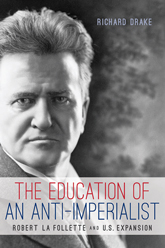|
The Education of an Anti-Imperialist
Robert La Follette and U.S. Expansion
Richard Drake
Studies in American Thought and Culture
Paul S. Boyer, Series Editor
“Richard Drake’s superb biography of Robert La Follette is a fresh, fascinating, and highly readable account of a great figure in American history. But it is also an important, indeed stimulating, analysis that can instruct our era how this popular U.S. Progressive senator from Wisconsin repeatedly and courageously stood up against his era’s reactionary and avidly pro-war politicians.”
—Walter LaFeber, Cornell University
Robert M. La Follette (1855–1925), the Republican senator from Wisconsin, is best known as a key architect of American Progressivism and as a fiery advocate for liberal politics in the domestic sphere. But “Fighting Bob” did not immediately come to a progressive stance on foreign affairs.
In The Education of an Anti-Imperialist,Richard Drake follows La Follette’s growth as a critic of America’s wars and the policies that led to them. He began his political career with conventional Republican views of the era on foreign policy, avidly supporting the Spanish-American and Philippine-American Wars. La Follette’s critique of empire emerged in 1910, during the first year of the Mexican Revolution, as he began to perceive a Washington–Wall Street alliance in the United States’ dealings with Mexico. La Follette subsequently became Congress’s foremost critic of Woodrow Wilson, fiercely opposing United States involvement in World War I. Denounced in the American press as the most dangerous man in the country, he became hated and vilified by many but beloved and admired by others.
La Follette believed that financial imperialism and its necessary instrument, militarism, caused modern wars. He contended they were twin evils that would have ruinous consequences for the United States and its citizens in the twentieth century and beyond.
Richard Drake is the Lucile Speer Research Chair of Politics and History at the University of Montana. His other published work in the field of American foreign policy includes Charle Austin Beard: The Return of the Master Historian of American Imperialism. He is completing an intellectual biography of William Appleman Williams.
Praise “Meticulously researched and wonderfully well written. . . . Drake carefully documents La Follette's Progressive anti-imperialist thinking—with all its flaws and inconsistencies, as well as its extraordinary fundamental insights and flashes of brilliance—that took ‘Fighting Bob’ from his roots as a McKinley Republican to his position as a holdout against America's entry into World War I and an irreconcilable opponent of the League of Nations and of the liberal, internationalist policies of his own Republican colleagues. As useful as Drake's book is for historians, it might most profitably be read by America's political thinkers, political leaders and policy makers.”
—Political Science Quarterly
“Drawing upon an extensive investigation of La Follette's voluminous correspondence and a close reading of La Follette's Magazine, Drake explains how the progressive politician's critique of big business and monopoly threats to American democracy was extended into a denunciation of American imperialism.”
—History News Network
“For diplomatic historians Drake makes a superb contribution to understanding the myriad expressions of American anti-imperialism, and for historians of the Progressive Era the work builds on Nancy Unger’s 2008 biography Fighting Bob La Follette.”
—Michael Cullinane, Journal of American History
“Drake has given us . . . an intense intellectual history of the most famous Wisconsin politician, how he grew and shifted his opinions dramatically.”
—Wisconsin State Journal
“A fresh perspective that often surprises with its insights.”
—Choice
“Doubtless this book will become the definitive study of La Follette’s foreign policy thinking.”
—Register of the Kentucky Historical Society
“This book addresses big themes: republic or empire, progressive politics, freedom and censorship in wartime, and congressional and executive foreign policymaking powers. A vivid portrait of Robert La Follette that shows why he was such a thorn in the side of those who sought to conduct ‘business as usual.’”
—Susan Brewer, author of Why America Fights
“There are other biographies of Robert La Follette, obviously, but none that probes so deeply into the intellectual development of an American anti-imperialist. This is a very important piece of scholarship that deserves a wide reading.”
—Lloyd Gardner, author of Three Kings: The Rise of an American Empire in the Middle East after World War II
Of Related Interest
|

Worse than the Devil
Anarchists, Clarence Darrow, and Justice in a Time of Terror
Dean A. Strang |
|

Larger images
PAPERBACK ORIGINAL
December 2013
LC: 2013015106 E
550 pp. 6 x 9
26 b/w illus.
|

